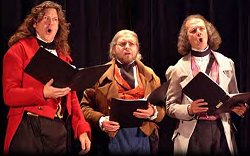Other Links
Editorial Board
- Editor - Bill Kenny
- London Editor-Melanie Eskenazi
- Founder - Len Mullenger
Google Site Search
SEEN
AND HEARD CONCERT REVIEW
The Mellstock Band are:

Dave Townsend (Director) - Concertina, Voice
Tim Hill - Clarinets, Voice
Philip Humphries - Serpent, Voice
Charles Spicer - Oboes, Cor Anglais, Voice
If you think Christmas cheer comes in bottles, then think again: the Mellstock
Band knows better. These virtuoso musicians - they are
all superb instrumentalists - kept an audience enthralled with a
two-hour programme of song,
dance music and readings that was at least thirty minutes too short. This
concert was so joyous, so uplifting and so downright heart-warming, that it
was positively therapeutic. The
audience felt happier for being there.
Dave Townsend is -
wait for it - a Morris Man, steeped in the English dance
tradition as deep as anyone can be. But he knows a forgotten secret
and he knows it very well: the English dance and song tradition is important
- not simply culturally (though that may be truer than many of us think)
but because it's packed with musical treasures.
This music is by no means
trivial. As Christmas music goes, it's as significant in its
own way as a very good Messiah or the King's College Festival of Nine
Lessons and Carols: it ought to be better known, especially
when done as well as it was here.
"West Gallery music"
or "Gallery
music" (and occasionally
"Georgian psalmody") of which the Mellstocks' carols
are examples, was performed by English parish church and
chapel bands and singers in the 1700s and early 1800s. It
was sung in both Anglican and non-conformist churches, and was
particularly popular in rural areas. Many (but not all) of its composers were amateurs and this large and
relatively neglected body of work is the antecedent for the later
American traditions of 'Shape-Note' and 'Sacred Harp'
singing.
Despite its deceptive simplicity, West Gallery music is
particularly emotionally expressive, fitting the words to be sung with a
sincerity hard to match elsewhere. When there's joy to be
celebrated, it's joyful; often with rollicking fuging tunes
that are sheer toe-tapping delight. When solemnity was called for
though,
West Gallery composers matched the mood with melody and simple
harmonies tailored precisely to the psalmody texts. Above all
however, this
is music written for both singers and listeners equally. "Since
singing is so good a thing,' William Byrd once said, 'I wish all men
would learn to sing."
West Gallery composers agreed.
A typical Mellstock Christmas programme has themed readings
- presented mainly by actor and oboe player Charles Spicer,
who has appeared with the National Theatre and the Royal
Shakespeare Company - from Hardy, William Barnes, Dickens (naturally) and others,
interspersed with much dance music from Hardy's time and with
carols from the Hardy MS. The three themes in this programme were 'Ghosts and Greenery -
Christmas Superstitions', 'There were shepherds abiding in
the fields' and then 'Then let us be merry.' And very
merry it was too, full of gentle good-humour and all-round
goodwill, all presented perfectly. Therapeutic, as I said at the
beginning.
So here's a prescription for a Christmas to remember,
if you need a last minute present for yourself (!) or for someone else. Rush out now for a Mellstock CD post-haste. Then,
after beginning Christmas Eve listening to the King's College
Nine Lessons and Carols on BBC Radio 4, (what else?) play the Mellstock
Band disc the next day. Your turkey will taste even better.
Bill Kenny
The Mellstock Band web site is
Here
